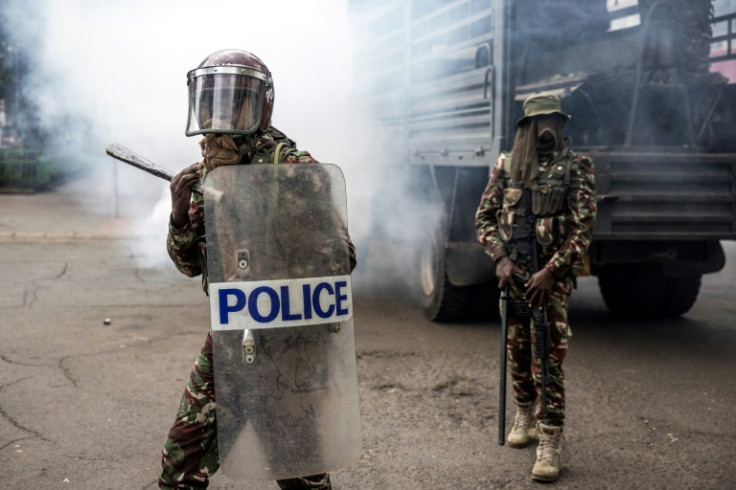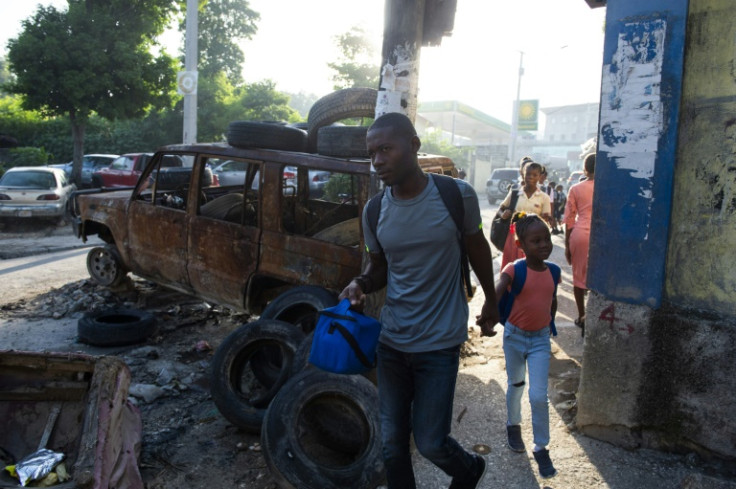Kenya Force Leaves Nairobi To Tackle Gang Violence In Haiti

A Kenyan force to lead a UN-backed multinational mission to tackle gang violence in Haiti departed Nairobi late Monday, interior minister Kithure Kindiki said, despite a court case against the deployment.
The East African nation offered to send 1,000 police to stabilise Haiti, alongside forces from several other countries, but the deployment has run into persistent legal troubles.
Some 400 officers left Nairobi at 10:50 pm (1950 GMT) aboard the national carrier, Kenya Airways, en route to Haitian capital Port-au-Prince.
"Honoured to see off the first batch of the contingent of the National Police Service officers who are part of the historic United Nations Mission to Haiti," Kindiki said in a statement, accompanied by images of the officers at the Jomo Kenyatta International Airport.
The group comprises elite officers from the Rapid Deployment Unit, General Service Unit, Administration Police, and Kenya Police.
The deployment came hours after President William Ruto -- an enthusiastic backer of the mission -- bid a ceremonial goodbye to the officers on Monday.
Media was not invited to the ceremony in Nairobi where Ruto prayed for the officers and handed them a Kenyan national flag, according to the footage shared by the presidency.
"This mission is one of the most urgent, important and historic in the history of global solidarity," Ruto told the officers in quotes shared by his office.
"Your presence in Haiti will bring hope and relief to communities torn apart by violence and ravaged by disorder," he said, adding that the rest of the force will join their colleagues "soon".
The deployment was approved by a UN Security Council resolution in October, only to be delayed by a Kenyan court decision in January.
The court said Ruto's administration had no authority to send officers abroad without a prior bilateral agreement.
While the government secured that agreement with Haiti in March, a small opposition party, Thirdway Alliance Kenya, filed a fresh lawsuit in another attempt to block it.
The party's leader, Ekuru Aukot, told AFP on Monday that he intended to "seek an injunctive order against the deployment".
"There is an active ongoing court case. So William Ruto is circumventing that because he does not believe in the rule of law," he said, describing the Kenyan leader as "a slave of America".
The United States had been eagerly seeking a country to lead the mission and is supplying funding and logistical support.
But President Joe Biden flatly ruled out US boots on the ground in Haiti -- the poorest nation in the Americas, where Washington has a history of intervention.
With the arrival of the Kenyan force, State Department spokesman Matthew Miller said: "We hope to see further measurable improvements in security, particularly with respect to access to humanitarian aid and core economic activity."
"We stand with the international community in supporting this historic effort to support the Haitian National Police in their fight for Haiti's future," he told reporters in Washington.
But Human Rights Watch has raised concerns about the Haiti mission and doubts over its funding, while watchdogs have repeatedly accused Kenyan police of using excessive force and carrying out unlawful killings.
A senior police official defended the force's record, saying they were an elite team that had gone through extra training.
"They have all undertaken a rigorous training for this exercise on top of their prior training of handling complex situations and are ready for the mission," he told AFP.
"Please let's not doubt their capacity."
Other countries that have expressed willingness to join the mission include Benin, the Bahamas, Bangladesh, Barbados, and Chad.
Haiti has long been rocked by gang violence but conditions sharply worsened at the end of February when armed groups launched coordinated attacks in Port-au-Prince, saying they wanted to overthrow then prime minister Ariel Henry.
Henry announced in early March that he would step down and hand over executive power to a transitional council, which named Garry Conille as the country's interim prime minister on May 29.
The violence in Port-au-Prince has affected food security and humanitarian aid access, with much of the city in the hands of gangs accused of abuses including murder, rape, looting and kidnappings.

© Copyright AFP 2024. All rights reserved.











